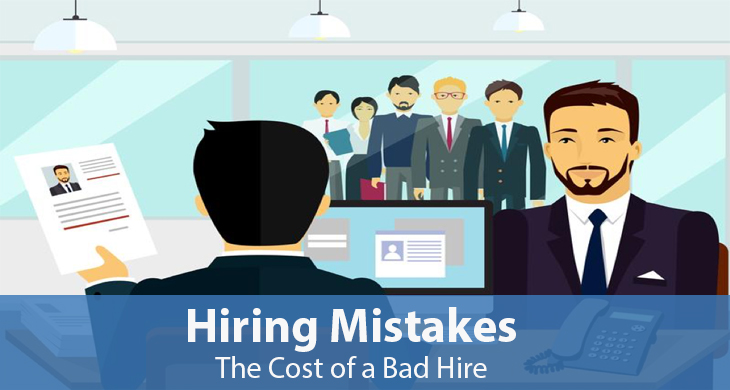Recruiting the best candidate for the job is what every hiring and HR manager aspires to do. Successful hiring is a benefit to everyone involved. It can help boost morale, productivity, and a business’ bottom line. However, very few people involved in hiring consider the very real impact of a bad hire. A bad hire can turn out to be a very costly hiring mistake. This blog discusses the costs of making a bad hire.
Table of Contents
The Costs of a Bad Hire
What constitutes a bad hire? For a hiring manager and for other employees, it can be a logistical nightmare. Certainly, no one sets out with the intent to create a negative hiring scenario. Sometimes it’s a matter of chance, one further reason to trust a professional staffing agency to vet your candidates.
A bad hire is often the result of misrepresentation on the part of the candidate. Less ethical candidates may be tempted to make certain exaggerations or outright misrepresentations on their applications and resumes. Read on to find out more about the costs of making a bad hire, Hiring Mistakes:
Increased Employee Turnover
Great employees are the lifeblood of any business. All businesses consider retaining top talent and limiting turnover to be a cornerstone of growth and productivity. However, competent and talented employees rarely like working with bad ones. Poor hiring quickly creates friction within your workforce. Ultimately, it will compel some of your top performers to leave their own jobs, thereby increasing turnover exponentially.
Drop-In Workforce Morale
High levels of business profitability, organizational loyalty, and employee productivity all derive from one common denominator: employee morale. Subpar candidates can severely impact workplace morale if they manage to make it through the recruitment process. Any impact on morale is an immediate threat to profitability, loyalty, and productivity.
Decreased Team Collaboration
Businesses rely on teamwork and synergy from their employees to achieve critical business goals. Most tasks require different employees to collaborate and execute cooperatively. However, because bad employees rarely fit neatly within the company culture of most businesses, they are not effective team players. Existing employers may find it difficult to engage and cooperate with them. When a bad hire is in a management position, the impact can be profoundly worse.
Damage to Company Reputation
A bad hire can have a massive impact on your company’s reputation in two respects. In the first instance, the negativity it might foster quickly leads to a drop in employee productivity and morale. This organization is perceived by candidates, employees, and peers. Once your business has the unenviable reputation of hiring bad employees, it will be much harder for you to attract top-tier talent.
The second way in which bad hires can damage your reputation relates to customer perception. A bad employee’s poor behavior with a customer can be enough cause for immediate and irreparable damage to your reputation. You will begin to lose customers and find it harder to acquire new ones as this poor reputation metastasizes in the marketplace.
Reduced Employee Productivity
Employee productivity requires both teamwork and morale in order to be maintained at a high level. But a poor hire can impact both of these factors, thereby reducing employee productivity. Reduced productivity in and of itself poses a plethora of problems, which can impact business continuity over the long term. This is one of the biggest reasons why bad employees are among the paramount hiring mistakes to avoid.
Monetary Costs
It can be more difficult to ascertain the financial costs of making a bad hire. It can cost thousands of dollars depending on whether you hire for an entry-level, mid-level, manager-level position. You will inevitably also have to deal with replacing bad employees, which has more costs associated with hiring.
Frequently Asked Questions
What are the most common hiring mistakes?
Making bad hires.
How do I stop making bad hires?
Thoroughly pre-screening candidates.
What are some common errors that managers make during interviews?
Believing candidate assertions at face value.
What recruitment practices would you avoid and why?
Not checking employee references, job history, and claims extensively.
What can go wrong in the recruitment process?
Many factors can go wrong, but they all result in an unsuitable hire.
